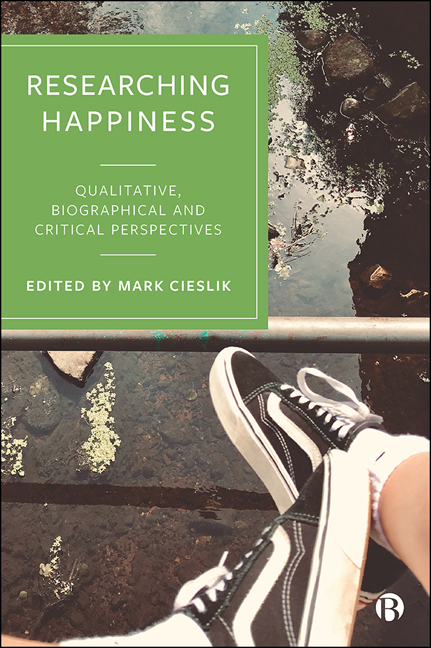Book contents
- Frontmatter
- Contents
- List of Figures and Tables
- Notes on Authors
- 1 Introduction: Developing Qualitative Research into Happiness and Wellbeing
- Part I Qualitative Research into Happiness/Wellbeing: Theories, Debates and Issues
- Part II Qualitative Research into Happiness/Wellbeing: Communities, Biographies and Identities
- Part III Qualitative Research into Happiness/Wellbeing: Methodological Innovations
- Index
3 - Happiness as an Affective Practice: Self, Suffering and Biography
Published online by Cambridge University Press: 22 December 2021
- Frontmatter
- Contents
- List of Figures and Tables
- Notes on Authors
- 1 Introduction: Developing Qualitative Research into Happiness and Wellbeing
- Part I Qualitative Research into Happiness/Wellbeing: Theories, Debates and Issues
- Part II Qualitative Research into Happiness/Wellbeing: Communities, Biographies and Identities
- Part III Qualitative Research into Happiness/Wellbeing: Methodological Innovations
- Index
Summary
Introduction
There has been a general reluctance on the part of sociology to engage substantively with happiness and the role it plays within people's everyday lives. While some notable exceptions exist (see Hyman, 2014; McKenzie, 2016; Cieslik, 2018), sociology has been suspicious of the topic because of a perceived emphasis within contemporary framings on positive subjective experience, the prioritization of inner potential, and its implication within neoliberal modes of government and the capitalist economy. This chapter argues that as a discipline we must transcend this critical lens because it obscures the socially situated and intersubjective aspects of happiness. By drawing on hermeneutic, interpretivist and phenomenological methods, sociology is well placed to offer an important corrective to the dominant research methods employed by positive psychology and happiness economics that emphasize the measurement of happiness and wellbeing and identification of determinants.
A limitation of quantitative methods used to explore happiness and wellbeing is that they obscure complex accounts of emotions, particularly the movement between and through different subjective experiences, such as emotions, feelings and thoughts, and how emotional experience is embedded in relationships between self and others, and self and world (Burkitt, 2014). Qualitative research methods work differently, drawing attention to ambivalent and contradictory understandings of happiness that are subject to ‘interactive and situational variation’ (Thin, 2018: 2–3). Interpretivist, phenomenological and hermeneutic informed approaches are, in contrast to positivist methods, better able to work with complex and provisional experiences and perspectives. Within these paradigms, research questions proceed differently. Instead of asking how happy a person is, they examine how people think about, understand and work at their happiness (Walker and Kavedžija, 2015; Thin, 2018). The relative lack of attention to people's own views and experiences is surprising since it is ‘an experience-near concept’ (Thin, 2012: ix), at once banal and yet simultaneously central to people's lives. Given the increasing scientific, policy and popular attention that happiness and wellbeing is receiving, further exploration of people's experiences and understandings of happiness is necessary.
Happiness is interwoven with ideas about the good life and in this way shapes perceptions of good (and happy) lives. A key starting point then is to recognize how happiness and emotional experience more generally are central to the production of self and the subject's evaluation of their place in the world.
- Type
- Chapter
- Information
- Researching HappinessQualitative, Biographical and Critical Perspectives, pp. 47 - 68Publisher: Bristol University PressPrint publication year: 2021



